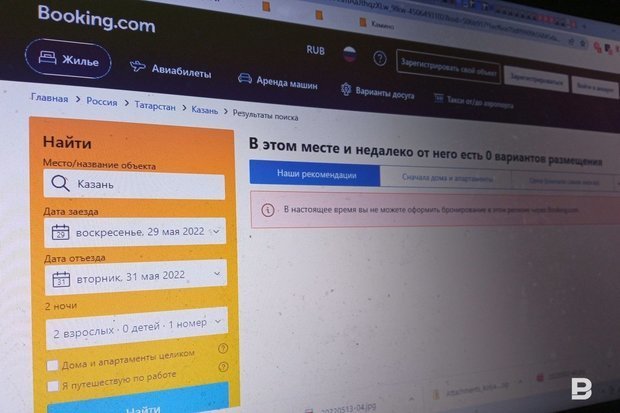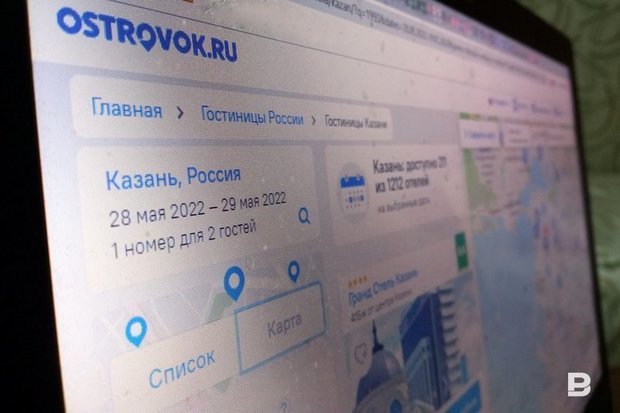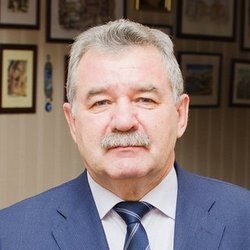Whether there is life without Booking: Kazan hotels changing sales tactics
With the withdrawal from the Russian market of international online hotel booking systems (Booking.com) and private housing (Airbnb), hotels in Kazan have reanimated channels for promoting services with the help of Russian aggregators. However, hoteliers are disappointed: during the May holidays, none of them could provide a 40% load of the room capacity, which Booking consistently brought, and the main sales were made by customer bases and their own hotel websites. “Today we are doing everything to accommodate a guest from our website and not pay a commission to aggregators (this is about 22% from each guest)," the head of Nogay hotel complex, Vitaly Bolshakov, explained the essence of the strategy.
Tourists have just started to find out that there is Bronevik and Ostrovok
By the beginning of the summer tourist season, Kazan hotels have managed to finalise their own booking system on websites and intend to limit themselves to a minimum commission for presence in Russian hotel aggregators. According to Kazan hotels representatives, few of them are willing to pay increased bonuses for promotion on these resources, as they do not expect to see good sales results due to weak awareness.

According to Tsykunov, Russian aggregators do not invest in advertising and promotion. “It is difficult for them to compete with Booking: its advertising budget is $1 million, while Russian systems earn about $2 million a year.”
The popular online booking services Booking.com and Airbnb left the Russian market in March of this year. At that time, the Russian Union of Tourism Industry noted that foreign portals provided 90% of services in their market segment. According to Alexandra Yushutina, the executive director of the Hotels Association of Kazan and the Republic of Tatarstan, the share of Booking in bookings of Kazan hotels and hostels was about 40%, so its withdrawal had a tangible impact on the load, and hotels faced the task of replacing booking channels.
“The May holidays are like New Year's holidays: one way or another, there are always reservations. And the biggest losses are on non-holiday days," Ilya Tsykunov says.

According to him, the process of restructuring the booking system is now underway, hotels are beginning to revive their websites, promote in social networks, begin to work closely with travel agencies, since domestic resources have not become an equivalent replacement for the withdrawn international players. “Regardless of how Russian aggregators work, hotels will always work, since Kazan remains in the top of tourist centres," Tsykunov is sure.
“It is written about us that the hotel is open without stars until August 13, but this is not the case”
Despite the weak recognition of Russian aggregators, Kazan hoteliers have begun to closely monitor their presence on these platforms and find inaccuracies in information presentation, which, in their opinion, prevents impressions in the search engine in response to tourist requests.
“If you request a 4-star hotel on Ostrovok, then our hotel is not seen, although we have 4 stars. If you enable the filter close to the centre, it is not searched again, although we are in the very centre of Kazan," says the director of Apart-hotel on Pushkina Street, 26 Tanzilya Kenzhibayeva.”
According to her, the hotel reanimated this sales platform due to the sudden withdrawal of Booking: “Then we found out that it was written about us that the hotel works without stars until August 13, although we have 4 stars. Having found this inaccuracy, I repeatedly asked to correct it, but they still haven't done it. I ask the managers: maybe we should close the account, open a new one and update the information. “Absolutely not," they answered me. “You are on service in an orderly fashion.” So far the information about us has not been changed," she complained in a conversation with Realnoe Vremya.

The head of the hotel said that during the May holidays Оstrovok.ru provided them a small volume of sales, but the main load was provided by direct bookings from their own website. “We launched it three years ago when we opened the apartment hotel, at the same time we had our own developer to be independent from hotel aggregators. At the same time, we continue to be present in the booking systems of Russian aggregators, but they are not bringing large volumes of load," she said. We will add that later the administration of Оstrovok.ru eliminated all the comments of the Kazan hotel.
“We do everything to accommodate a guest from our site”
Nogay hotel complex in Kazan, which is controlled by Svyazinvestneftekhim state holding, has a similar situation with bookings. With the withdrawal of Booking, the administration intends to take the promotion into their own hands, not intending to share much with aggregators.

According to him, most of the bookings came from his own website and customer base. “We have a lot of guests who come not for the second or even the third time," he said. For the influx of tourists, Nogay is improving its booking system so that tourists can book a room as quickly as possible and with fewer clicks.
At the same time, the complex does not abandon any Russian aggregator, which are now trying to take the place of the withdrawn international resources. According to Vitaly Bolshakov, TravelLine, Yandex.Travel and Bronevik turned out to be the most effective.
Don Quixote hotel chain: calculations are made during the day
Mikhail, the representative of Don Quixote hotel chain, on the contrary, is pleased with the transition to Russian booking systems. According to him, the state of shock after disconnecting from Booking lasted for the first month and a half, but then the aggregators started working.
“Our hotel has not lost anything. It is more profitable for us that we work with a Russian integrator. You will pay the commission to Booking, it is processed for several days. But here the money is transferred from us to the integrator and back within one day. This applies to all aggregators: Ostrovok, OneTwo Trip, 101 Hotels, Tril," he said.
At the same time, Kazan hoteliers are concerned about how the rating system for evaluating hotels will be resumed, which helps tourists choose a suitable hotel.
“When tourists came to us, we asked — how did you find us? Then the hotel was new, few people knew about it. 60-70% of tourists were guided by our rating in Booking, which was 9,7 points out of 10. While on Ostrovok we have only three reviews, the rating is 9,1 and the information is crooked," Tanzilya Kendzhibayeva is concerned.
Vitaly Bolshakov also asks to resume the rating of hotels. Ilya Tsykunov adds: “Booking was not only an aggregator, but also made it possible to evaluate the geolocation of the hotel. If we compare the map of Kazan using the Yandex.Maps system and the platform Booking.com, then the latter had much more objects than on the Yandex map.
Hoteliers are most dissatisfied with the large commission of aggregators, which reaches 22% with VAT for hotels and 30% for hostels. “If you want to be above the rest and be closer to the search, you have to increase the fee and pay an increased commission for promotion. For hostels, it is almost 30%. But there will always be someone who pays a 50% commission, and he will be above the rest. Now the minimum Ostrovok threshold is 22%. If someone doesn't like it, then nothing can be fixed. If you want guests, agree and work. If you want to be higher in the ranking, pay!” explained Tsykunov. However, the press service of the aggregator clarified that, for example, the apart-hotel operates on a commission of 15% from the booking, and not 22% per annum, as indicated in the extranet.
Aggregators allow tourists to compare prices
With the withdrawal of Booking, Kazan hotels began to develop their websites for booking rooms not to pay a commission. Is there a threat to aggregators in this?
“There is none," says Anita Gusich, the head of the Ostrovok platform's PR service. “In the great scheme of things, the hotel should work with all promotion channels: with website, aggregators, social networks to increase the hotel's load. We don't see any competition in this. On the contrary, the more load sources the hotel has, the better.”
According to this service, Kazan has entered the top three tourist destinations in terms of the number of bookings for the May holidays (1st — St. Petersburg, 2nd — Moscow).
The most popular categories of accommodation are three-star hotels (their share was 23% of all bookings in Kazan for the May holidays, and the average cost of a night was 5,200 rubles), four-star hotels (the share is 22%, the average cost of a night is 8,000 rubles), apartments (the share is 13%, the average cost of a night is 6,500 rubles), hostels (12% share, the average cost of a night is 1,800 rubles), two-star hotels (11% share, the average cost of a night is 4,400 rubles).
According to the interlocutor of the publication, aggregators can be convenient for hotel customers with a large selection and the opportunity to compare prices. “If tourists comes to Kazan for the first time, how will they understand where it is more convenient for them to live? He come to the platform and gets a selection of hotels. At the same time, he can apply more than 50 filters when choosing a suitable place: if he is driving, then parking is needed. Or with children. If with a dog, then there are special options," explained Anita Gusich.

According to her, recently the aggregator has faced a large influx of hotels. “Of course, our phones are ringing off the hook. But we know about the problem and are solving it, we have increased the technical support service, attracted an additional call centre, created a special Telegram channel for hoteliers. In a word, we try to advise them through all channels," Gusich said.
The fact that Kazan hotels had few bookings may be due to their high availability, she believes: “In my opinion, it depends on what availability the hotelier 'sets'. Maybe they have set some restrictions, and not all availability is reflected in the booking system. Sometimes hotels hold promotions “book two nights and get a third as a gift” or do not allow reservations for less than three nights. In my opinion, they themselves can regulate the activity of room booking.”